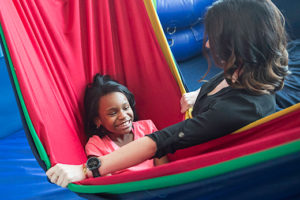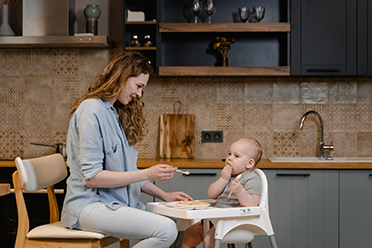Feeding: An Occupational Therapy Perspective

Mealtimes can be challenging for many of our kiddos. Sensory integration, regulation, the environment, and physical abilities all impact our children’s independence in feeding and mealtime routines. Occupational therapists can offer a unique perspective and tips to support feeding and mealtimes! Below is a brief overview of developmental milestones for feeding as well as several strategies that can be used to support independence in feeding.
Developmental Milestones:
0-3 months
- Latches to nipple/bottle
- Sucks and swallows during feeding
- Takes breast milk or formula
4-6 months
- Shows interest in food and opens mouth to spoon
- Moves pureed foods in mouth
7-9 months
- Holds/drinks from bottle
- Eats thicker foods and enjoys chewing to soothe teething
10-12 months
- Finger feeds soft foods
- Starts using open cup; may be ready to start with utensils
13-18 months
- Independent with open cup; grasps spoon
- Eats most foods by 1 year; participates in family mealtime
18-24 months
- Increased use of utensils; can pick up and bring foods to mouth
- Harder to chew foods
24-36 months
- Fills spoon with hands (instead of scooping)
- Faster and more efficient with eating; stronger chewing
Physical & Motor-Based Strategies
- Use built-up/adaptive utensils: there are many adaptive utensils available for children. Thicker, built-up handles make grasping a lot easier, while a curved or bent handle can support motor planning when bringing the utensil to the mouth. Ask an occupational therapist for recommendations of appropriate utensils!
- Seating and positioning: make sure your child’s trunk/upper body are supported, food is within reach, and body is upright in chair or highchair. Sit directly in front of your child while feeding in order to support engagement!
- Practice oral motor skills: licking food off corners of mouth, blowing bubbles, sucking through a straw, making silly faces, using chewy toys or oral vibration toys (ask an OT or speech therapist for recommendations), and chewing on tougher foods or on foods in mesh food bags can all help strengthen oral motor skills necessary for successful eating
Sensory-Based Strategies
- Experiment with different tastes, textures, shapes, and colors of food: exposure to many types of food can help to increase a child’s food repertoire and makes eating more exciting and engaging.
- Have your child interact with the food! Touch, taste, smell, lick, play, etc. Kids are always more motivated to do an activity if it is fun and silly!
- Gradually introduce different foods; only introduce one at a time: if you are trying to expand your child’s food repertoire, take it slow. Introducing a LOT of foods at once can be very overwhelming and may decrease engagement with the food.
- Encourage family mealtimes and social interaction during meals: if possible, try to build a routine around mealtimes so that they are predictable and safe for your child.
- Create a comfortable environment: use calming sounds, try to limit distractions, use appropriate seating, and model a positive attitude towards food and eating.
- Try different colors, shapes, or patterns on plates and utensils: a plate with your child’s favorite cartoon character on it can make eating so much more fun!
- SOS Approach to Feeding: a wholistic approach to feeding. More information on the SOS Approach can be found here!

Eyas Landing is a therapy clinic with a mission to provide evidence-based and family-centered therapy services for children, adolescents, and their families. The primary goal is to deliver relationship-based interventions within the most natural environments and to empower families to reach their full potential. To achieve this goal, our highly educated, compassionate staff dedicates time and expertise to create experiences that maximize therapeutic outcomes. The strength, determination, and perseverance of our clients are evident as they succeed in therapy, and ultimately in their daily lives.
Eyas Landing offers a wide range of comprehensive services including Speech Therapy, Occupational Therapy, Physical Therapy, ABA Therapy, Social Work, Family Therapy, and Neuropsych testing. Services are provided throughout the Chicagoland area via Telehealth, In-Home, and in our state of the art clinic.
Want to learn more or you have a specific question? Feel free to connect with us here!



